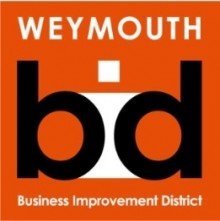‘A number of business leaders from Weymouth are taking action which could benefit almost everyone who lives in the town. They want to take advantage of a government scheme that allows firms to raise the money needed to make improvements to the local economy.
They are doing this by launching what’s called the ‘Weymouth BID’. This is a scheme that’s worked successfully for other towns, including Dorchester.
What is a BID?
A BID (Business Improvement District) scheme is defined as “a business-led initiative supported by government legislation which gives local businesses the power to ‘raise funds locally to be spent locally’ on improving their trading environment”.
How does it work?
A steering group is created by interested local businesses that defines the BID area and consults other businesses within that area about the sort of improvements that they would support. A BID proposal is then formed and eligible businesses vote on whether to accept it. Over 50% of businesses that vote must be in favour of the proposal and this must represent more than 50% of the rateable value of the votes cast. If accepted, all businesses within the BID area are legally obliged to pay the levy, regardless to how they voted. A BID scheme usually operates for five years after which time its progress is reviewed.
What would this mean for Weymouth?
The Weymouth BID would generate between £900,000 and £1.2 million over a five year period which would then be invested in an agreed programme of local improvements. The money would be largely raised by levying a non-domestic rate of between one and one and a half per cent on all businesses within the BID area which comprises the town centre, harbour, seafront and Preston.
Suggested areas that the BID could tackle are the problems associated with the seasonality of a seaside town by leading marketing campaigns designed to extend the holiday season, as well as improving the experience of people visiting Weymouth, developing better information services and helping the night time economy by increased safety and security measures.
When will it happen?
The BID is currently in the consultation stage which finished at the end of August 2012. The vote on whether to accept the proposals will take place in May or June 2013. There are around 500 businesses with a rateable value of above £6000 that are eligible to vote.
The legacy of the Games
Brian Cooper, Chairman of the BID Marketing Sub Group said: “The London 2012 Games have handed Weymouth businesses a massive opportunity to tackle future seasonality. The sheer scale of the TV exposure for Weymouth, Portland and the World Heritage Coast will make this one of the area’s main legacies, winning gold for businesses in Weymouth. The Weymouth BID, should it get a yes vote at ballot next year, will take a leading role in capitalising on this unique situation – so we are urging businesses to be a part of it.”
For more information, visit the BID website www.weymouthbid.co.uk . All businesses in the BID area are invited to fill in the online questionnaire, although only those with a rateable value of £6000 or more will be eligible to vote.’
We would be interested to hear from locals as to whether they believe that policies that affect the town should be left to a vote by businesses that have rateable values of £6000 or more. Is this democracy? Should the future of our town be in the hands of those who only look to profit? It seems that the obsession with traders to make as much money as possible is why Weymouth and Dorchester and others are becoming unpopular with those who live there. Perhaps if these towns focused upon the inhabitants more then the tourism would take care of itself. Like many other issues including the recent sexual abuse revelations – whilst we keep our heads down and our noses out – that is exactly how they like it.
Douglas James







